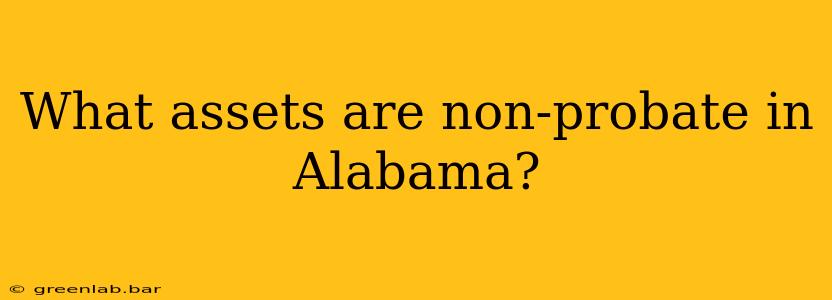Navigating the probate process in Alabama can be complex and time-consuming. Understanding which assets are considered non-probate can significantly simplify estate administration and save your heirs both time and money. This guide outlines the key types of assets that bypass the probate court in Alabama.
Understanding Probate in Alabama
Before delving into non-probate assets, let's briefly define probate. In Alabama, probate is the legal process where a court oversees the distribution of a deceased person's assets according to their will or the laws of intestate succession (if they died without a will). This process involves validating the will, paying debts, and distributing the remaining assets to beneficiaries.
Probate can be costly and time-consuming, involving court fees, attorney fees, and potentially lengthy delays. Therefore, utilizing assets that avoid probate is a valuable strategy for efficient estate planning.
Key Non-Probate Assets in Alabama
Several types of assets automatically bypass the Alabama probate process. These include:
1. Assets with Payable-on-Death (POD) or Transfer-on-Death (TOD) Designations:
- Bank Accounts: Designating a beneficiary on your bank accounts ensures the funds are transferred directly to that individual upon your death, avoiding probate.
- Brokerage Accounts: Similar to bank accounts, brokerage accounts can be set up with TOD designations, allowing for direct transfer of assets to beneficiaries.
- Retirement Accounts (401(k), IRA, etc.): These accounts typically have beneficiary designations that dictate how the funds are distributed after death, bypassing probate. It's crucial to keep these beneficiaries updated to reflect your current wishes.
Important Note: While these accounts bypass probate, they are still subject to federal and state tax laws.
2. Jointly Owned Property:
Property owned jointly with a right of survivorship passes directly to the surviving owner upon the death of one owner. This applies to real estate, bank accounts, and other assets held jointly. The surviving owner automatically inherits the deceased's share without court intervention.
3. Life Insurance Policies:
Life insurance policies with named beneficiaries typically pay out directly to those beneficiaries upon the death of the insured, avoiding the probate process.
4. Trusts:
Assets held in a properly structured trust are managed by a trustee according to the trust's terms. These assets are not subject to probate upon the grantor's death. This is a sophisticated estate planning tool that offers significant flexibility and control over asset distribution. Various types of trusts exist, each with its own specific advantages and disadvantages. Consulting with an estate planning attorney is crucial when considering a trust.
5. Payable to a Specific Person Items:
Items like certain types of bonds, certificates of deposit, and even stocks may have a designated beneficiary. This prevents these items from falling under probate.
The Importance of Proper Estate Planning
While these assets avoid probate, proper estate planning remains crucial. Keeping beneficiaries updated on all accounts, ensuring accurate documentation, and considering the potential tax implications are essential steps in minimizing complications for your heirs. Consulting with an estate planning attorney in Alabama is highly recommended to ensure your assets are distributed according to your wishes and in the most efficient manner. They can help you navigate the complexities of probate and create a comprehensive estate plan tailored to your specific circumstances.
Disclaimer: This information is for general guidance only and does not constitute legal advice. You should consult with a qualified attorney in Alabama for advice tailored to your specific situation.

